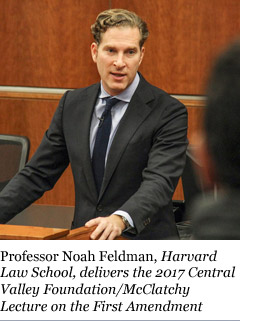Professor Noah Feldman Delivers Central Valley Foundation/McClatchy Lecture on First Amendment
 Professor Noah Feldman of Harvard Law School presented the seventh annual Central Valley Foundation/James B. McClatchy Lecture on the First Amendment to a packed Kalmanovitz Appellate Courtroom audience on January 26. Video of the lecture may be viewed here.
Professor Noah Feldman of Harvard Law School presented the seventh annual Central Valley Foundation/James B. McClatchy Lecture on the First Amendment to a packed Kalmanovitz Appellate Courtroom audience on January 26. Video of the lecture may be viewed here.
Feldman, who is the Felix Frankfurter Professor of Law and a Senior Fellow of the Society of Fellows at Harvard, is a widely acclaimed scholar whose work focuses on the relationship between law and religion, constitutional design, and the history of legal theory. Speaking to an audience that included a large turnout of King Hall faculty as well as Central Valley Foundation co-founder Susan McClatchy, Feldman delivered a talk on “The Three Lives of James Madison.”
Following brief introductory remarks by Dean Kevin R. Johnson and Steve Boutin '72, a shareholder at Boutin Jones and member of the Central Valley Foundation board, Feldman delivered a talk based on his forthcoming book, The Three Lives of James Madison, due in October from Random House. He described the career of James Madison, “the father of the Constitution,” in three phases, emphasizing his evolving attitude regarding religious freedom, freedom of the press, and the Bill of Rights.
Madison entered public life as an advocate for religious freedom at the Virginia Constitutional Convention of 1868. At the United States Constitutional Convention of 1787, he proposed a system in which Congress could veto any state legislation as a means of protecting against government suppression of individual liberties. When that proposal failed, he became convinced of the need for a Bill of Rights and composed the First Amendment in something very close to the language we know today, Feldman said. Madison became a fierce advocate for freedom of the press as a result of Congress’s passage of the Alien and Sedition Acts, under which newspaper editions were jailed and fined for criticizing government officials.
Madison, who was president 1809-1817, held a belief in the First Amendment that was so uncompromising that he remains the only wartime president not to have taken significant steps to restrain freedom of the press, Feldman said. He also declined to interfere with the Hartford Convention, in which New England Congressmen discussed their grievances with the War of 1812 and considered a separate peace between their states and Great Britain.
“Madison seems to have believed that the whole point of the existence of the United States was nothing other than to preserve liberty, that the whole point of the Constitution that he had designed in his first life, that he had fought for brutally in his second life, and that in his third life he was trying to conduct in a way that would allow the United States to survive and to make it a nation among nations, was none other than to guarantee the very rights that are present in the Bill of Rights,” said Feldman. “If the country could not be sustained without violating those rights, Madison believed, it was not worth having the country at all.”
